The Climate Action Platform of the University of Colorado Anschutz School of Medicine
The Climate Action Platform at the University of Colorado Anschutz School of Medicine is dedicated to empowering human potential for a more resilient world. These discrete efforts at mitigating the health impacts of climate change are ingrained with optimism and the ethos that small, cumulative efforts can make a difference.
The Platform tackles the most tenacious problems of adaptation and resiliency with targeted interventions. Leaning on the talents of our academic innovators, the Platform’s metrics of success include empowering communities, supporting research, and sparking workforce development for health challenges to come.
Hotshot Medicine: Wildland Firefighter First Aid
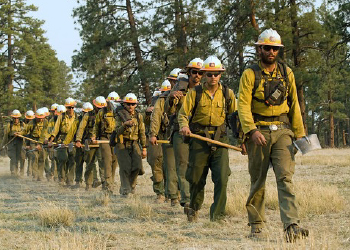 As
climate change increases both the intensity and duration of wildland fires, there is an unprecedented demand to train and deploy wildland fire fighters.
As
climate change increases both the intensity and duration of wildland fires, there is an unprecedented demand to train and deploy wildland fire fighters.
Historically, this group has had a lack of medical training, and now the CU Climate & Health program has teamed up with the United States Forest Service to provide the Wildland Firefighter First Aid training program.
This two-day course, taught by our wilderness medicine experts, is designed to keep firefighters safe and resilient while deployed in remote environments and in the face of climate-driven forest fires.
Beyond The Algorithm: Climate Disaster Response Advanced First Aid (DRAFA), in the Northern Marianas
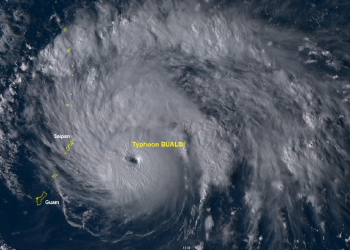 Disasters happen fast and can overwhelm a community’s ability to respond. Essential services are disrupted, and pre-hospital and hospital systems are overwhelmed.
Disasters happen fast and can overwhelm a community’s ability to respond. Essential services are disrupted, and pre-hospital and hospital systems are overwhelmed.
In partnership with the Natural Hazards Center—which seeks to provide resiliency support for vulnerable communities—we have initiated Climate Disaster Response Advanced First Aid training in the Northern Marianas. This 24-hour training program is geared toward lay people and frontline first responders—building a reserve corps of community members trained to scale up in the face of a disaster. The Northern Marianas are particularly vulnerable to climate warming-energized tropical cyclones, sea level rise, and water insecurity. Our Climate DRAFA training provides knowledge, skills, and confidence to prepare for and respond to the injuries and trauma caused by disasters in the hours and sometimes days it takes organized rescue to arrive.
Supporting the Science: National Science Foundation Arctic Research Support
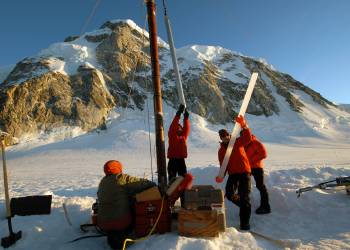 Climate science is the bedrock foundation for data-driven policy solutions supporting climate health. We are privileged to support the National Science Foundation in
its mission to empower climate researchers throughout the circumpolar north.
Climate science is the bedrock foundation for data-driven policy solutions supporting climate health. We are privileged to support the National Science Foundation in
its mission to empower climate researchers throughout the circumpolar north.
The data it provides underpins our risk assessments about climate change and informs our imperative to act. At CU, we provide medical direction, online medical control, and on ice medical services to NSF researchers and staff performing science in some
of the most remote and hostile environments on Earth. As clinicians, we can think of no better way to utilize our skillsets than helping remote field researchers advance our understanding of ecosystem changes and the ensuing cascades that will affect
our health.
New Frontiers in the National Science Foundation’s Ice Core Laboratory
 Global warming has disproportionately affected the cryosphere. As the Arctic is now more accessible than ever before in human history, it has become more relevant to geopolitics and national security concerns. The Department of Defense, seeking our expertise in remote and austere care in the context of climate change, has asked us to stand up a laboratory to assess how to optimize medical care in exposed Arctic environments.
Global warming has disproportionately affected the cryosphere. As the Arctic is now more accessible than ever before in human history, it has become more relevant to geopolitics and national security concerns. The Department of Defense, seeking our expertise in remote and austere care in the context of climate change, has asked us to stand up a laboratory to assess how to optimize medical care in exposed Arctic environments.
We have partnered with the National Ice Core Laboratory in metro Denver. Utilizing their 40-degree-below facilities, we are studying how medics perform field resuscitations in prolonged cold environments and measuring cognitive and manual dexterity degradation compared with room-temperature controls. This “proof-of concept” laboratory is another opportunity to optimize human health within a changing climate.
Becoming an Enviromedic: Climate First Responder
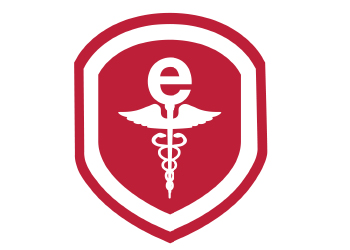
Estaiblished in partnership with the National Renewable Energy Lab in Golden, the Enviromedic course is designed as a certification for lay people to receive first-responder training, contextualized to climate threats. The course offers participants the opportunity to receive world-class training to build a knowledge base and develop the decision-making skills necessary to effectively (1) understand sources of climate-related health threats facing communities in the U.S., now and in the future; (2) prepare for anticipated climate change impacts through community adaptation and energy resilience strategies; (3) build community health resilience through first responder certifications; and (4) gain a rudimentary understanding of energy services for affected communities (electrical safety training).
The Enviromedic course tailors trainings to emphasize local threats (tropical cyclones, wildfires, degraded air quality, flood/landslides, etc.). In addition to building community resiliency, the Enviromedic certification will be an integral part of the
national priority for health care workforce development in climate and health, and a “gateway” certification to further career opportunities in the health care industry.
Change Agents: Advancing the Frontiers of Climate & Health - The CU Science Policy Fellows
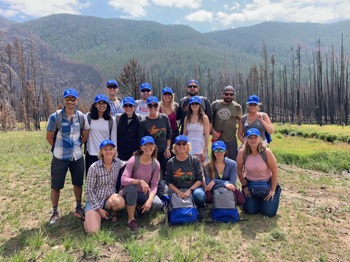 Our
National Climate & Health Science Policy Fellows are defining what it means to be a climate doctor. The potential for scalability and impact have elevated the following initiatives to the 10x.10 Climate Action Platform:
Our
National Climate & Health Science Policy Fellows are defining what it means to be a climate doctor. The potential for scalability and impact have elevated the following initiatives to the 10x.10 Climate Action Platform:
- Coding for Climate Sensitive Diseases
- Gathering and sharing accurate and comprehensive data on climate-sensitive public health threats is exceptionally difficult. The current lingua franca for recording health care diagnoses, procedures, medical services, and equipment is through standardized medical codes, codified as the 10th edition of the International Classification of Disease (ICD-10), but when it comes to climate exacerbated disease, there is no hospital billing code for “hottest day of the year,” “unprecedented extreme weather,” or “patient harmed by climate change.” Summing up a patient care interaction in a medical diagnosis code often feels impersonal and an imperfect fit for the clinician caring for that individual, but this system has the advantage of enabling a searchable, comprehensive database through a massive range of illnesses, injuries, and deaths and helps us understand and even predict disease trends and emerging pathologies and support strategies to deliver better care. Improving health care recordkeeping for climate change-harmed patients in emergency rooms and hospitals is a simple way for us to start building that sorely needed evidence base. Ultimately, better accounting of the tremendous human suffering already being fueled by climate change can motivate and inform expanded ambition to cut climate pollution and strengthen community preparedness, and keep more people out of harm’s way for years to come. (Credit Stefan Wheat MD, CU Climate Fellow 2021-22)
- Beating the Heat: FEMA
- Embedded with the Federal Emergency Management Agency (FEMA), our fellows are working to implement equity and resilience in federal disaster response. For example, as we understand that extreme heat disproportionately impacts vulnerable communities (e.g., communities of color; those with medical co-morbidities; economically disadvantaged; English as a second language, etc.), our fellows are helping to operationalize FEMA’s stated principles to “instill equity as a foundation of emergency management." Likewise, they’re working on heat mitigation strategies for workers within disaster response missions to “promote and sustain a ready FEMA and prepared Nation” and “lead the whole of community in resilience.”
- ClimateRx Campaign: Enhancing Patient Engagement on Climate & Health
- While the majority of physicians acknowledge the adverse health outcomes that will result from climate change, relatively few engage their patients on this issue in the clinical setting. In partnership with ecoAmerica, we conceived ClimateRx, a novel, non-interruptive, web-based tool to allow busy clinicians to educate patients on how to safeguard their health from climate hazards and mitigate their climate footprint. The success of this pilot study of the ClimateRx program will provide early lessons for a replicable template for dissemination and maturation of the program to other health care settings. (Credit Stefan Wheat MD, CU Climate Fellow 2021-22)
Todd Miner, EdD |
Margaret Power |
Elaine Reno, MD |
Kellie Schiller |
David Young, MD |
.png?sfvrsn=845285ba_0&MaxWidth=150&MaxHeight=200&ScaleUp=false&Quality=High&Method=ResizeFitToAreaArguments&Signature=FFF8ED35A898FD401784094760AD6B01CE805244)
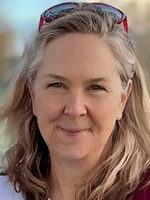
.png?sfvrsn=955385ba_0&MaxWidth=150&MaxHeight=200&ScaleUp=false&Quality=High&Method=ResizeFitToAreaArguments&Signature=5EA712F147F69AE6F1150153517E9192BC3C3B64)

.png?sfvrsn=db5085ba_0&MaxWidth=150&MaxHeight=200&ScaleUp=false&Quality=High&Method=ResizeFitToAreaArguments&Signature=BBD5BDF7A6C3B751A100B81E282932010820DE3D)